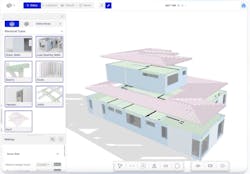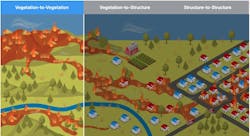10 Innovators That Reveal Housing's Future
Key Takeaways
- The $100,000 winner of the 2025 Pitchfest competiton developed an AI-generated program that prepares structural and MEP documents for approvals a fraction of the time and money
- The Judges’ Choice Award went to an online program that offers a data-driven, shared view of wildfire risk and actionable solutions for communities
- The Audience Choice Award honored a platform that enables wannabe homebuyers to “hack” the purchasing process through co-buying
On June 11, on the Innovation Stage at PCBC, an annual housing industry conference and trade show in Anaheim, Calif., 10 companies with designs to bring innovation to the housing industry engaged in the 3rd annual Pitchfest, a housing focused startup competition with a $100,000 prize on the line.
“Pitchfest is a meaningful platform to curate the best entrepreneurs in the housing space and connect them with the right audience to gain meaningful feedback,” says Dennis Steigerwalt, president of the Pittsburgh, Pa.-based Housing Innovation Alliance (the Alliance) and Pitchfest founder.
His organization co-led this year’s annual competition with strategic partner Home Technology Ventures (HTV), a venture capital firm in Charlotte, N.C., that has been funding companies in the construction sector since 2013.
“Real impact only happens if things get to be commercialized,” Steigerwalt added. “Getting entrepreneurs in front of industry decision-makers is a substantial step in the right direction.”
How it Works
With a mission to “find great entrepreneurs working on the biggest challenges in housing,” Chris Langford, managing partner with HTV, says his team screens companies year-round and invites them to apply, followed by an open submissions period.
The 2025 competition focused on solutions impacting the following five areas: reducing the housing supply deficit; making housing more attainable; reducing housing’s carbon footprint; simplifying owning and managing a home; and adapting existing homes for new needs.
From more than 100 entrants, a consortium of the Alliance members, industry professionals, home builders, materials and technology companies, and residential and property technology investors reviewed and rated them across four key dimensions:
- Innovative. Are they proposing something novel compared to how things are solved today? Is it groundbreaking?
- Impact Potential. If the team is successful in its mission, how big is the potential impact that it would have on the challenge it is addressing?
- Commercialization Potential. Do the innovators have a reasonable plan to get to scale in the next five years?
- Entrepreneurial skills. Will they be able to get capital to actually bring this thing to life?
HTV and the Alliance considered aggregated scores and included “a bit of personal judgment, as well,” Langford says, to determine the 10 finalists that would “pitch” live on stage at PCBC.
Although the companies that were deemed finalists are at various stages in their growth, many already have solutions they are ready to scale with the right industry partners.
The 2025 Winners
As expected, the live Pitchfest at PCBC was highly competitive and enlightening, as contestants made their initial proposals come to life through a 10-minute presentation followed by 5 minutes of Q&A with the audience.
Judges and members of the audience—the latter both live and via LinkedIn—evaluated the financial potential of each finalist for generating a venture-sized return by the novelty of its innovation, the entrepreneurial experience of the founders, the valuation of the investment structure, and the scale of the potential outcome.
After reviewing the judges' feedback and analyzing the audience votes, three solutions emerged as this year's winners:
Spacial earned the coveted $100,000 funding from HTV with a solution that delivers AI-generated structural and MEP plans that are reviewed, stamped by a licensed engineer, and ready to submit in a fraction of the time and money that process currently consumes.
“Pitchfest at PCBC was a defining moment for Spacial,” says Maor Greenberg, the company’s co-founder & CEO. “It affirmed that the future of residential construction belongs to those who blend deep domain expertise with transformative technology.
Greenberg says he built the company to simplify permitting and engineering, “Not just with automation but with insight.”
The Judges’ Choice Award, which typically reflects a practical belief that an innovation will make a significant impact on the industry in the near to mid-term, went to XyloPlan and its data-driven, shared view of wildfire risk, with actionable solutions that enable fire adapted communities.
“PCBC was the perfect venue for an early-stage company like XyloPlan to connect with the developers, builders, and insurers who share our vision of building safely alongside the risk of wildfire,” says Scott Cheeseman, CEO & co-founder. “New construction can lower community-wide risk and create more resilient neighborhoods.
Nestment, a platform that enables wannabe homebuyers (particularly Gen Z and Millennials) to “hack” the purchasing process by co-buying properties, earned the Audience Choice Award, determined by live attendees who voted using an app and others via LinkedIn using online polling that not only considers the innovation and business plan, but also often goes to the team with the most captivating and inspiring presentation.
"As a company trying to make homeownership possible for the millions of Gen-Z and Millennials, it was great to connect with those in the construction industry and understand ways that we could align both demand-side and supply-side solutions,” says Niles Lichtenstein, Nestment’s CEO and co-founder.
The remaining seven finalists included:
- Adept Materials offers a technology the revolutionizes vapor, humidity, and temperature management in buildings.
- Apis Cor is an automated construction solution that uses advanced robotics technology in 3D printing.
- Aquaria Technologies’ water generator makes fresh, clean, abundant water from the air.
- Genia uses AI to create structural drawings from floor plans in minutes.
- Hamlet pairs AI with human oversight to “sit in” at public meetings and make the information accessible quickly to enable faster, better decisions by developers and builders.
- Pallet Shelter creates rapid-response shelter villages to help bridge the gap from living on the street to finding permanent housing.
- Shovels’ digital solutions helps construction industry professionals identify qualified contractors, understand their work history, and connect with decision makers.
“Each of these founders is building an amazing company with purpose and drive,” says Steigerwalt. “Looking beyond Pitchfest, we’ll continue to support these entrepreneurs through our national platform.”



